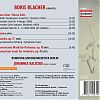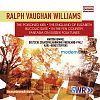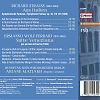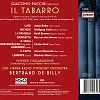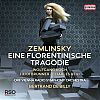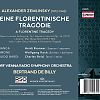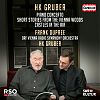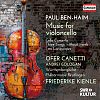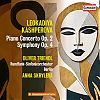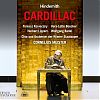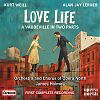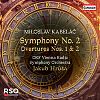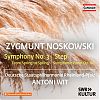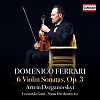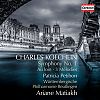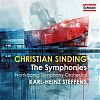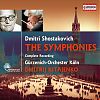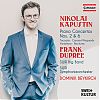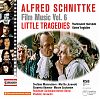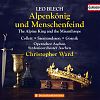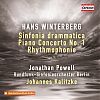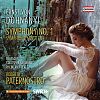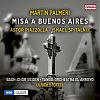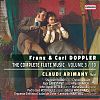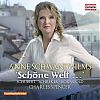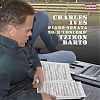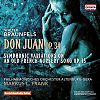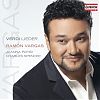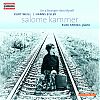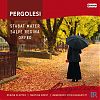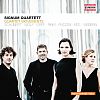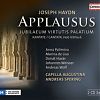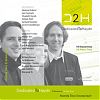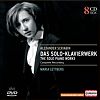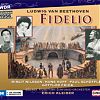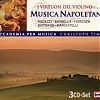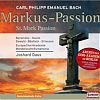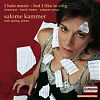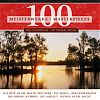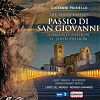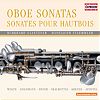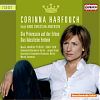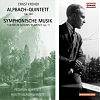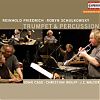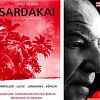cd

BORIS BLACHER (1903-1975)
RUNDFUNK-SINFONIEORCHESTER BERLIN · JOHANNES KALITZKE
What Boris Blacher passed on to many of his students – like Gottfried von Einem, Aribert Reiman or Isang Yun - primarily also characterizes his own music: a pronounced gestic and dance-like energy, lyrical melodies, orchestral sparkle, but also very subtle and intimately instrumented moments. The Poemeis an excellent example of the fact that for Blacher, who wrote a large number of ‘genuine’ ballets, movement plays a central role even in works that are to be understood as absolute music. It sounds almost a little strange that such an individualist and musician open-minded to absolute innovation had no direct problems with the conditions imposed by Nazi cultural policy also on the whole field of music, but quite the opposite, was in a position at that time to compose some of his major works. . It was probably due to the disunity of the pundits in the Third Reich that Blacher was permitted to continue his very individual course, without being disciplined too severely.
Weitere Bilder

DMITRY KABALEVSKY (1904-1987)
YURY REVICH · MAGDA AMARA · DEUTSCHE STAATSPHILHARMONIE RHEINLAND-PFALZ · KARL-HEINZ STEFFENS
Many of the today distinguished Soviet composers in the second half of the 20thcentury knew how to steer a middle course, enabling them to supply what was officially desirable and yet to remain faithful to themselves, writing the music they wanted to write. Kabalevsky was a Jack of all musical trades and, as a specialist for children’s music especially, cultivated a highly personal style, kept in easily comprehensible tonal aesthetics. His works are characterized by some of the features typical of Kabalesky’s overall oeuvre: a cornucopia of melodious imagination, dance rhythms, above all in the fast movements, expansive slow sections and a positive, often cheerful tone.
Youtube
Weitere Bilder

EDUARD KÜNNEKE: HERZ ÜBER BORD
WDR FUNKHAUSORCHESTER KÖLN WAYNE MARSHALL
Driven by success, Künneke committed himself to the genre of the operetta in the 1920s and 1930s. The diversity of his many operettas reveals Künneke’s enormous adaptability to the stylistic currents of entertainment music at that time. He had most international success with Der Vetter aus Dingsda (1921), with which Künneke has almost exclusively been identified up to today. His successful operettas were even adapted for London and New York. Herz über Bordwas premiered in 1935, initially at the Zurich Opera and was performed almost 500 times between 1935 and 1937, including in Dresden, Stuttgart, Stockholm and Berlin. The Berliner Zeitungnoted: ‘Once again, we can listen to operetta music written by an artist, a man of taste. Every number has its own weight’.
902
Weitere Bilder

R. STRAUSS: Aus Italien · WOLF-FERRARI: Suite Veneziana
Ariane Matiakh
‘Never have I really believed in inspiration by the beauty of nature; I was put right by the ruins of Rome. There my ideas just flew to me.’ Richard Strauss
"Aus Italien"was the first major symphonic poem mirroring diverse moods to be composed by Richard Strauss and that was to be followed by later masterpieces such as Don Juan, Tod und Verklärung, Ein Heldenleben or Eine Alpensinfonie. The Venetian Suite was written in 1935 by then almost 60-year-old Ermanno Wolf-Ferrari. It is the music of an opera composer, accustomed to illustrating events with his music, and yet in his concert works handing over many things to the imagination of the listeners, not wanting to give all the answers in advance.
Weitere Bilder

GIACOMO PUCCINI: IL TABARRO
WIENER SINGAKADEMIE · ORF VIENNA RADIO SYMPHONY ORCHESTRA · BERTRAND DE BILLY
Opera in un atto / Opera in one act (1913-16)
Libretto: Giuseppe Adami (1878-1946) nach / after Didier Golds „La Houppelande
LUIGI: Johan Botha, Tenor / tenor
MICHELE: Wolfgang Koch, Bariton / baritone
LA FRUGOLA: Heidi Brunner, Sopran / soprano
GIORGETTA: Elza van den Heever, Sopran / soprano
IL TINCA / LIEDERVERKÄUFER (Song Seller) / LIEBENDER (Lover)
Charles Reid, Tenor / tenor
IL TALPA: Janusz Monarcha Bass / bass
LIEBENDE: Elisabeta Marin, Sopran / soprano
WIENER SINGAKADEMIE
(Einstudierung / Chorus Master: Heinz Ferlesch)
ORF VIENNA RADIO SYMPHONY ORCHESTRA
BERTRAND DE BILLY, Dirigent / conductor
With "Il tabarro" Puccini wrote the first part of his projected opera triptych, with which he ultimately intended to parody and reverse Wagner’s Ring tetralogy by stringing together three completely incoherent short stories. Once more, for Il tabarro the composer virtually emigrated to France, to which he had already made declarations of love with La Bohème and Manon Lescaut. This affinity is now mirrored more clearly than in these two operas in the music of The Cloak, which emanates French, well-nigh Impressionist perfume. Bertrand de Billy knows how to make the the score alive with a fantastic cast on his side. World famous tenor Johan Botha was on the top of his carreer.


